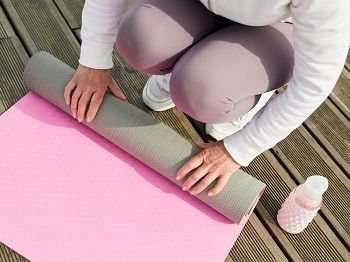Tips to Boost Immune System Function
Article by Alex Milzer - bio on our Editorial Team.
The immune system is a multifaceted network of cells, tissues, and organs. Its primary use is to help the body fight infections, diseases, viruses, and harmful toxins. In a nutshell, once the immune system recognizes that one of the above invaders has entered our body, it produces antibodies in the form of white blood cells, designed to combat the invaders. The stronger the immune system, the quicker and more effectively it can make those ever-important white blood cells.
So, can the immune system be strengthened? Absolutely! Below, we detail specific things you can do to boost your immune system to assure you are doing all you can to stay healthy.
Get Sufficient and Restful Sleep
The body’s ability to produce high white blood cells is the vehicle by which the immune system fights infections and diseases. Numerous studies have shown when the body lacks sufficient sleep, our white blood cell count can drop. As published in the National Library of Medicine, one study compared the white blood cell count among 15 young men after they were given a full 8-hours rest versus sleep deprivation. The results showed that a specific type of white blood cell called granulocytes dropped in the count and mirrored the body’s stress response; thus, making the body’s immune system less efficient at fighting dangerous viruses, diseases, and infections.
Lack of sleep can negatively affect other essential immune system boosters, as well. Numerous studies have shown a correlation between sleep deprivation and increased obesity rates. Additionally, bad sleeping habits decrease the likelihood of regular exercise; and even when exercise is being performed, low athletic production is typical. Fortunately, there are numerous things you can do to increase your amount of sleep.
Consistent and Proper Exercise
It is no secret that regular exercise results in numerous positive effects on the human body, including increased immune function. However, how much exercise is too much? And are there types of activities that can weaken your immune system?
The answer seems to be unclear and highly debated among medical professionals. Indeed, regular exercise reduces stress hormones and lowers inflammation – both critical factors in immune function. However, some studies suggest that both High-Intensity Interval Training (HIIT) and Marathon Training can suppress immune function. One study indicates there could be a link between HIIT and upper respiratory infections. For this reason, we recommend riding on the safe side and performing regular, moderate exercise.
So, what is moderate exercise exactly? We consider moderate exercise as enough physical activity to raise your heart rate and build a sweat, but not overdoing it to the point of exhaustion. If you perform HIIT or marathon training, then definitely avoid such activities when you feel exhausted or slightly sick, increasing the chances of a suppressed immune system. If you are looking for new and fun fitness activities, here is our exercise section.
Nutrition and Immune System
Nutrition affects the immune system either positively or negatively, depending on the vitamin and nutrient quality consumed. In laments terms, the food and beverages one eats and drinks affects how their immune system functions. So, if you are on a beach, partying for the weekend, eating quesadillas, and drinking margaritas all day, then you could be at risk of catching a cold once upon returning to work.
What we eat and drink affects the fats in our bodies. Why is this important? Because fats support the immune system by absorbing vitamins. They then are used to create cell membranes and work with hormones to regulate enzymes in fat synthesis. Here is a full list of foods to help boost the immune system.
Immune System Nutritional Fact Chart
| Immune-Boosting Nutrients | Food |
| Vitamin A | Fish, Meat, Poultry, Dairy, Fruits & Vegetables |
| Vitamin C | Fish Roe, Fish Liver, Eggs, Fruits & Vegetables |
| Vitamin E | Nuts, Seeds, Salmon, Trout, Goose, Fruits and Vegetables |
| Probiotics |
Dairy, Kombucha, Pickles, Traditional Buttermilk |
| Protein |
Meat, Poultry, Seafood, Soy, Fruits, and Vegetables |
| Zinc |
Meat, Poultry, Shellfish, Whole Grains, Fruits and Vegetables |
Stress and the Immune System
Stress, depression, anxiety, and ever fear can weaken the immune system. The correlation between mental health and the immune system is a bottomless sea of the undiscovered. We know this: Cytokines, a group of proteins in the body, produces disease-fighting T-cells, located in the thymus gland, which support the immune support by killing infected host cells that enter the body. In laments terms, stress lowers the body’s ability to produce t-cells, leading to a weakened immune system.
The American dream is a low stress, high paying job… sounds like passive income to me! But how do we lower our stress levels? So, the big question is, how do we reduce our stress levels? The Buddha would say mindfulness. Indeed, that is one part of the equation, but you should also dedicate time and energy to regular exercise, getting plenty of sunshine, and deep belly laughs.
Sunshine, Vitamin D, and the Immune System
Vitamin D can be found in the foods we eat, and in also the sunshine we relish. The more sunshine the body absorbs, the higher the vitamin D intake. As cited by NIH, The body needs vitamin D to absorb calcium. Without enough vitamin D, one cannot form enough hormone calcitriol (known as the “active vitamin D”).
The release of serotonin in your body, a hormone responsible for increased mood, is increased by the amount of sunshine you receive every day. Whether you are riding a skateboard or surfing a killer wave, you’ll be happier moving your limbs among the rays and sparkles.
4 Components of the Immune System
Two components make up the immune system.
- Innate Immune System – Helps to protect against injuries and pathogens. Includes: skin, mucous membranes, and bacteria-killing properties.
- Adaptive Immune System – Helps protect against changing of cells in the body. This includes antibodies, T-Cells, B-Cells.
Where is the Immune System Located in the Human Body?
This is not a straightforward answer because the immune system is, well, as a system. Cells, chemicals, and specific organs work together, elaborately. The lymphatic system, lymph nodes, thymus, and spleen are just a few parts of the body involved in this fascinating process. White blood cells act as the soldiers who seek out and attack foreign invaders in the body. The lymph nodes behave as a purifying screen that filters out germs whose mission is to spread to other parts of your body. And the tonsils and adenoids are like a spider web that traps invaders before they can enter deeper into your body.
What are the Signs of a Weak Immune System?
It is a common misconception that warts are a sign of a weak immune system. The immune system helps prevent skin infections and growths, but if you or your child develops a wart in an unpleasant place, you are just fine. Signs that one does have a weakened immune system include infections, inflammation, digestive issues, autoimmune disorders, blood disorders, and developmental delays.
Ways to Kill Your Immune System?
Much of this is discussed previously in the article; however, commonly known ways to weaken your immune system include sleep deprivation, insufficient sunshine, poor dietary choices, stress and mental illness, and drug and alcohol use.



